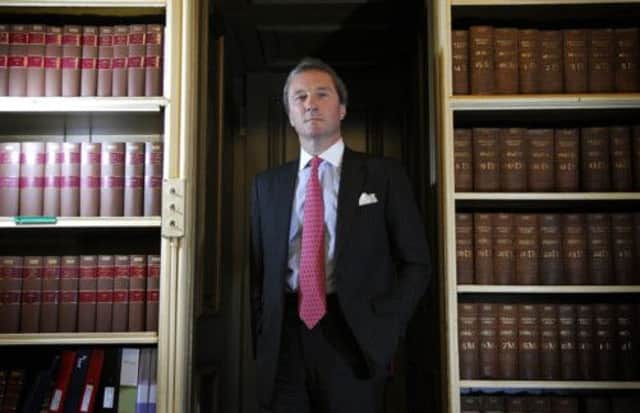Leaders: Keen to produce a persuasive case


He succeeds the MP David Blundell, effective from January. He may bring, as Ruth Davidson, the Scottish party leader declared yesterday, “one of the UK’s leading legal brains” and “a wealth of external experience”. But his ambition to revitalise the party is a truly formidable challenge. And he has little time to lose. His appointment comes with the referendum on Scottish independence and elections to the European Parliament less than a year away; a general election in 2015, and elections to the Scottish Parliament in 2016.
Recent poll results indicate some signs of improvement. But these are dwarfed by the size of the mountain Scottish Conservatives have to climb if they are to present a credible challenge to Labour and the SNP. The party’s voting base has shrunk. Recovery has been thwarted with many traditional Conservative supporters preferring to give tactical support to the SNP to frustrate the party’s historic enemy, Labour. This helps to explain why the support for the SNP in Holyrood elections is higher than poll support for a Yes vote in the referendum.
Advertisement
Hide AdAdvertisement
Hide AdMany Conservative associations are moribund, where they have managed to survive at all. Its ageing membership reflects a general decline in party political participation, and it has been unable to mount any significant rejuvenation. Even though there are many in Scotland with small ‘c’ conservative attitudes, the party has been unable to articulate a compelling programme to give expression to this, or to make its appeal resonate with younger voters.
And the Holyrood political culture has militated against a Conservative recovery. The party can claim to have helped to bring about the council tax freeze and lower rates for small businesses while maintaining a nuanced opposition to wind farm development and greater scrutiny of Scottish government spending. But few are listening, or are unable to hear, because of the raucous criticism since 2010 of “Tory spending cuts”, potent in a country where public spending accounts for a significantly higher share of GDP than in other parts of the UK. Finally, politics in Scotland has come to be dominated, particularly over the last two years, by the independence issue.
Having previously opposed devolution and sought to draw a line under further transfers of power to Edinburgh, the party has swung in the past year to support for more powers for the Scottish parliament. While that change was broadly accepted, it will take time before voters have confidence that the party has settled on a sustainable position. In the meantime, it lacks a convincing and compelling leadership capable, not just of winning back older voters but attracting new ones. Richard Keen will need all of his powers of persuasion in the task he has set himself.
Absence emphasises the point
If Prime Minister David Cameron was truly intent as he says on sending a “tough message” to the government of Sri Lanka at the Commonwealth summit over the country’s alleged war crimes, he could have sent one as forceful as it would have been unambiguous: he could not have attended at all.
The prime minister of India, Manmohan Singh, and the prime ministers of Canada and Mauritius are staying away in protest over allegations that the regime of Sri Lankan president Mahinda Rajapaska carried out war crimes at the end of a civil war with Tamil separatists four years ago. The UN estimates that some 40,000 civilians were killed in the final months of the 26-year conflict.
Mr Cameron argues that there has to be “proper inquiries” into these events and this is why he has rejected calls to boycott the meeting in Colombo.
However, the Sri Lanka government has had ample opportunity to provide more credible answers than it has so far supplied on the many questions raised. Yet not only does it continue to deny involvement and to frustrate inquiries, but it also makes clear its view that he has no right to bring up the subject.
Mr Cameron has set aside pleas by Tamil representatives to join the boycott, arguing that he could achieve more by using his attendance to “shine a spotlight” on “some of the human rights issues”. But the Sri Lankans have protested that they are a sovereign nation.
Advertisement
Hide AdAdvertisement
Hide AdThat, however, in no way absolves it of the need to account to the world for its actions, and the need for Commonwealth leaders to make a clear stand on an issue that continues to cause widespread global concern.